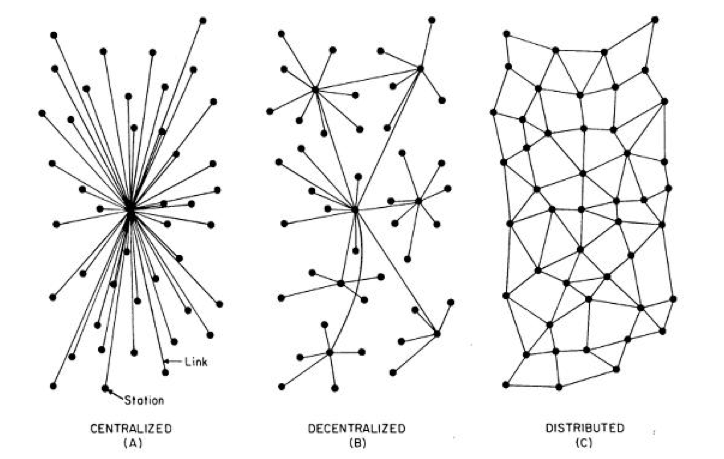In the early days of the Internet everything was based on decentralized solutions. If you wanted to run a website in the early '90s, you went to an electronics retailer and got yourself a PC. You would set it up at home somewhere and people had direct access to the information you wanted to provide. Each PC on the early web was connected to each other, but then the whales attacked.

Source: Screenshot (by myself) of a GIF
The first web-hosters arrived and the need to take care of your own server(s) slowly vanished. We didn't see that we made ourselves dependent on the long run. Few big corporations like Amazon or Google control the data of many people. Our data isn’t save. The premise is that the bigger and more powerful the corporation is that I trust my data with, the more likely it is that my data is secure for a long time. As a result, the services offered by these corporations became more and more extensive and invasive. The internet we use today revolves around large monoliths. Huge "nodes" in the network.
The data we request from these nodes will be routed. This means that the data packet that is finally passed through my network card to my computer will be passed from one node to the next until it reaches my internet service provider which transfers it directly to my routing device. The data volume in 2018 is already massive. Every node that your package has to pass through a gigantic traffic arises. In addition, data can be read by shady individuals or your government (if the encryption is missing or broken).
Everyone uses these services, they work and enrich our lives. Why should you still worry about it?
Because it is bad for our entire economy. In a good economy, production of a good increases over time and generates value. In a bad economy, the opposite is the case. Big players like Google, Facebook, Amazon, Alibaba, Apple, and many more collect data about us and turn it into money. As the services they offer are already fully connected and diverse, it is nearly impossible for a startup to compete without using technology from the said corporations. Corporations regularly swallow each other and thus continue to dry out the market. Too much power is already spread on a few individual companies. No one of us is really in control over how the data is used. The value of this resource will continue to increase in the future, data is the new gold. Collecting information about customers is very important. Anyone who has the collected data from for example the Uber (or mytaxi, ..) service can use this data to process data that is relevant for governments. If several people with different Uber drivers get picked up from one location at the same time or in quick succession, a private event or meeting can be proven. This information can be used to generate new data and so on. If states can access sources from several tech companies, they can be used to establish relationships between them. A total surveillance state is no longer in the future and our politicians are therefore responsible for dealing with these informations in a respectful and responsible manner.
When you are talking about a centralized network, it's mostly about classic client/server architectures. If the server fails, the network is gone too. A distributed system, as defined by Andrew S. Tanenbaum, is an assembly of independent computers that present themselves to the user as a single system. Regarding services like Facebook, Google and co you are talking about a centralized-distributed system. When it is time again to check the old holiday photos on your ex-gf timeline from your cozy living room in Vienna your are supplied by datacenters in Europe. Facebook decides from the location of their users from where they are supplied.

Source: /ipfs/QmNhFJjGcMPqpuYfxL62VVB9528NXqDNMFXiqN5bgFYiZ1/images/centralized-decentralized-distributed.jpg
In a decentralized network, there are several servers that are equal to each other. If one (or more) fails, but there is a sufficient amount of servers left for the service to run, the service is still available. With that, we are slowly going in the direction I originally wanted. I am talking about the blockchain.
In my next post I will give you a heads up about what the blockchain is and how we can use it in our lifes. Leave a like if you want to support me and thanks for reading!